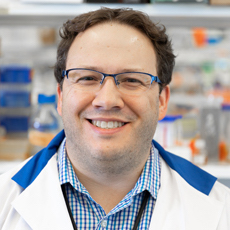The Kattah Lab aims to understand how intestinal epithelial cells contribute to disease. The ultimate goal is to develop patient-tailored treatment strategies that maximize efficacy and minimize toxicity for individual patients.


The Kattah Lab aims to understand how intestinal epithelial cells contribute to disease. The ultimate goal is to develop patient-tailored treatment strategies that maximize efficacy and minimize toxicity for individual patients.

Dr. Kamada’s lab investigates how gut microbiota and host immunity interact in gastrointestinal health and disease. Their focus is on the mechanism by which certain pathogenic members of commensal bacteria promote chronic intestinal inflammation that leads to Inflammatory Bowel Disease.

Dr. Ekici is using the newest technology for high-throughput profiling and data analysis in a broad spectrum of human genetics research.

The Fitzgerald lab investigates the molecular mechanism controlling the innate immune response during infection and inflammation. They focus on therapeutic targeting of Inflammasomes and nucleic acid sensing pathways to treat inflammatory diseases.

By coordinating collaborative multi-disciplinary research efforts and public-private consortium, Dr. Colombel implements major clinical trials that have the potential to significantly improve treatments for patients across the spectrum of IBD.

Dr. Davis’s lab focuses on the mechanical and electrophysiological properties of lymphatic smooth muscle and endothelium and how dysfunction of those cell types contributes to lymphedema.

Dr. Denson’s multi-center research program focuses on discovering underlying mechanisms and better therapeutic approaches in chronic inflammation, growth and mucosal healing related to adult and pediatric patients with IBD.

The Fairn lab studies a variety of aspects related to vesicular and non-vesicular transport of lipids, lipid metabolism, membrane dynamics and the cell biology of immune cells.

Dr. Gerwert works in the field of protein science, aiming to detect neurodegenerative diseases at an early stage to prevent progression to symptomatic conditions.

Using genetic approaches, the Guo lab seeks to understand and reprogram the molecular “language” of host-microbe interactions in health and disease for potential therapeutic applications.